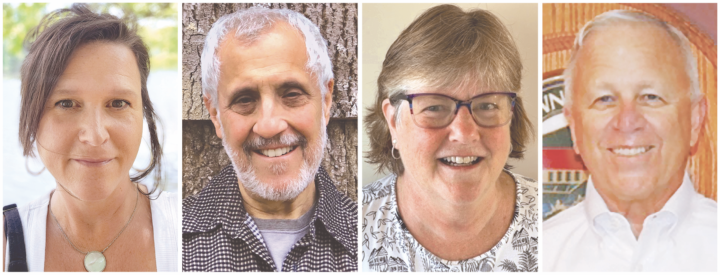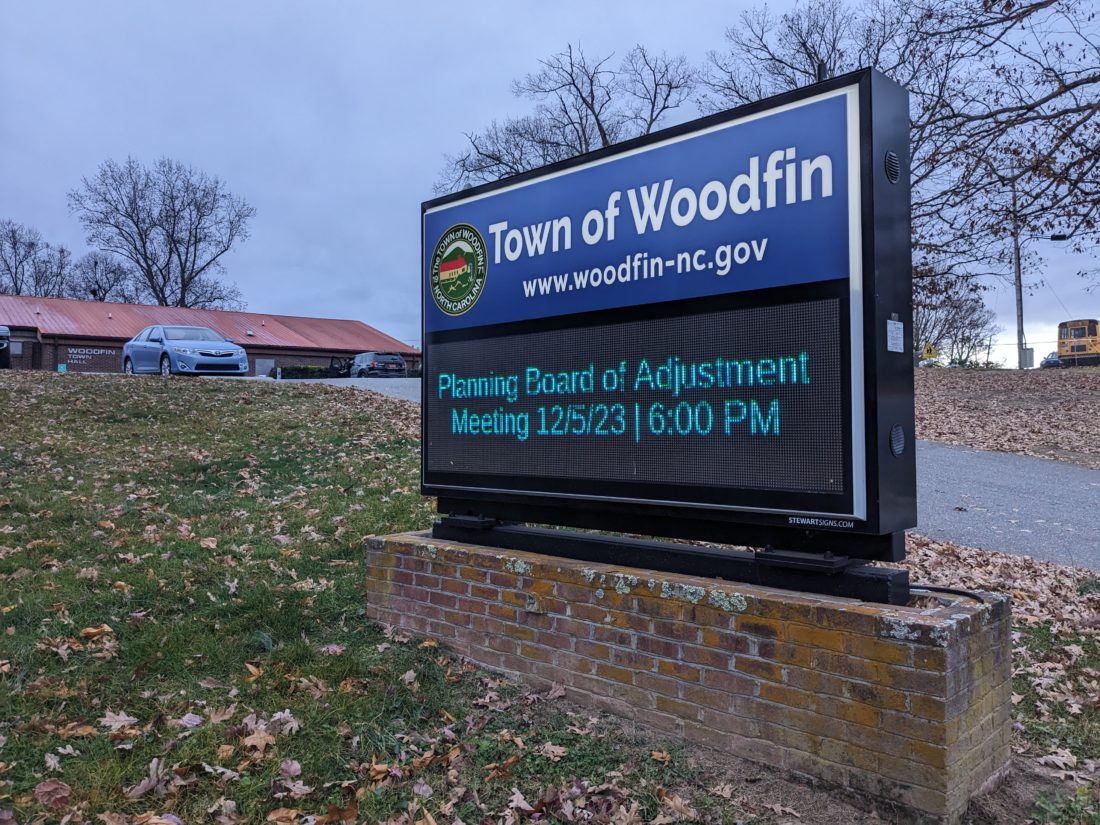Turnover was the theme in election results Nov. 7. Among the 10 winners in three jurisdictions, only one had appeared on a ballot before. Two of the 10 had been appointed but were running for the first time. Another was running for a different position. All the rest will hold office for the first time.
New direction for Woodfin
Jim McAllister, who was voted in as mayor of Woodfin, says his promotion from Town Council member to mayor symbolizes a new direction for the town of about 8,000 that borders Asheville to the north.
“Being elected mayor is a huge honor that means the residents of Woodfin trust me to lead the town government in the right direction, using transparency and treating everyone the same,” he says.
McAllister plans to be more proactive in his new role than his predecessor, campaigning to bring more businesses to Woodfin and recruiting young people to get involved in civic matters.
He replaces longtime Mayor Jerry VeHaun, who chose not to run again for the post he held for 20 years. No one is left on Woodfin’s Town Council who was elected before 2021.
“I think it is clear that the voters of Woodfin are interested in positive, environmentally responsible progress in Woodfin. This includes how developments are approved, and the steps that are taken to mitigate the problems that come with growth,” says newly elected Town Council member Johanna Young.
The wave of new Council members in Woodfin started two years ago after plans for a huge development just west of the French Broad River — The Bluffs — were shelved in the face of strong public opposition. A record 20% of voters turned out that year to vote in three new Council members who wanted more rigorous development rules, like a steep slope ordinance.
This year, about 17% of voters completed the sweep for a brand-new Council as growth and development has continued to dominate the conversation around Town Hall.
“I think it signals that the majority of the voters acknowledge that managing growth requires an active, forward-thinking philosophy,” says Council member-elect Ken Kahn. “The alternative is to let the future happen to us, as opposed to directing it where possible.”
As the town prepares for a likely influx of tourists after the projected completion of a man-made whitewater wave in the French Broad River at Riverside Park next summer, the incoming Council wants to ensure as much money as possible is spent in Woodfin, instead of trickling back to Asheville.

McAllister has his sights set on establishing a Woodfin Business Association, something Elisabeth Ervin, who was appointed in 2022 to replace the retiring Jim Angel, says will help showcase what the town has to offer.
Petition for removal
Although not everyone is thrilled with the direction of Woodfin, the new Council appears to be improving its reputation in parts of the community that don’t necessarily want to be part of the town at all.
After implementation of a stormwater fee this summer rankled many residents who live west of the river, resident Chip Parton started circulating a deannexation petition to his neighbors.
Thus far, he has gathered roughly 250 signatures of property owners who would rather not pay taxes to the town, and he is still amassing support.
Parts of the west side of the river were annexed by the town in 2006 and 2009 despite pushback from many residents there. He says his neighborhood has a more rural feel from the rest of the town and could just as well get trash and police services from the county rather than the Town of Woodfin.
That being said, Parton is happy with the election results and is especially impressed with how the mayor-elect has responded to his concerns.
“I feel heard. People who have not started the job yet have already had more conversations with me about how to improve our town than I’ve heard in the last 17 years,” he says.
McAllister and Town Manager Shannon Tuch, who has been on the job since March 2022, told Parton they are willing to set up a community meeting in January to hear concerns from those that want to be deannexed. Any deannexation has to be approved by the N.C. General Assembly, but support from the town for the movement would go a long way politically to getting the case heard, Parton argues.
For McAllister, turnout in the election shows exactly what Parton is saying: that Woodfin residents finally feel as if they’re being heard.
“This indicates that Woodfin is a real town and that folks have confidence that they are being listened to. It’s truly a new day for Woodfin’s future,” he says.
Kahn, who will be the first resident who lives west of the French Broad River on Woodfin’s Town Council, agrees.

“I think the past two years have set the stage. We intend to be open to our voters but also active in the areas that each of us wants to emphasize,” he says. “If anything, I hope residents feel that the next two to four years will be marked by a council that listens and that acts.”
A transparent water district
The three-member Woodfin Sanitary Water and Sewer District Board of Trustees has all new members after its two longest-serving members, Sarah Gassaway and Ivo Ballentine, were voted out. The third member, Gordon Maybury, was elected after being appointed by the Buncombe County Board of Commissioners in February. The other two newly elected members are Lauren Edgerton and Larry Hopkins.
Despite its name, the district serves water, but not sewer, to about 10,000 customers across three municipalities. Only about half of them can vote for the three-member board of trustees that governs the district.
Growth in service area and moving sanitation responsibilities to the Metropolitan Sewerage District has changed the district since its roots in the 1920s, but the voting district’s size has remained the same.
Dealing with those anomalies factor into the new trustees’ priorities, says Maybury, who wants to change the voting district boundaries to match the Woodfin town boundary and increase transparency in the board’s actions.
The district’s former trustees rejected a request to livestream board meetings, which were held in the middle of the typical workday, precluding most residents from attending, Edgerton says.
“The first step we will take is to ensure that board meetings will be livestreamed for all members of the public to see. That there should be increased transparency in local government has always struck me as an uncontroversial position, and the results of this election suggest the voting public agrees,” she says.
Indeed, more than three times as many votes were cast in 2023 — 1,320 — than in 2019 — 392.
“The fact that our electorate is now highly engaged is — more than the result of any one person being elected — the most important takeaway from the election,” she says.
Other priorities for the elected trustees include improving relations with the Town of Woodfin and development of a long-term capital projects plan, something the district has not had in the past, Edgerton says.

Weaverville’s future
John Chase was the only true incumbent to win in the county. He was joined by two other newcomers on Weaverville Town Council.
Similar to Woodfin and many towns surrounding Asheville, growth and development issues ring in as Weaverville’s top ongoing challenges.
Chase focused his campaign on advocating for continued study of the town’s zoning regulations and comprehensive land use plan.
Council members-elect Dee Lawrence and Peter McGuire both agreed that the management of inevitable growth will be their most important job. Part of that job, they say, is to inform their constituency of what powers the town has when it comes to zoning regulations.
Overall, the new additions to Town Council say that while there is work to do, Weaverville has a lot going for it, and they hope to continue that positive momentum.
McGuire says, “I am extremely proud of what Weaverville is and what it has to offer. People want to live here; people want to raise their families here. As urbanization has progressed, Weaverville has done an excellent job in protecting green space, transforming its police force to alternative energies, providing a spectacular community center and nature parks, and maintaining its character.”






Before you comment
The comments section is here to provide a platform for civil dialogue on the issues we face together as a local community. Xpress is committed to offering this platform for all voices, but when the tone of the discussion gets nasty or strays off topic, we believe many people choose not to participate. Xpress editors are determined to moderate comments to ensure a constructive interchange is maintained. All comments judged not to be in keeping with the spirit of civil discourse will be removed and repeat violators will be banned. See here for our terms of service. Thank you for being part of this effort to promote respectful discussion.